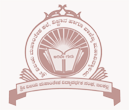Department of Computer Science
S V M Arts Science and Commerce College Ilkal
Department of Computer Science
Department of Computer Science started in the year 2000-2001. The Department aims to provide quality education and computing skills among students which is essential for present competitive world and fast growing IT industry.
Founder teacher were, Mr. S. K. Sajjan, Mr. Vinayak, Mr. B. M. Hiremath and Mr. Vikram Gangal etc and present HOD Miss. Shreedevi P Gotur took change the department during the academic year 2016.
Two other department faculties are Miss. Gunasheela V Hiremath and Mr. Mahantesh S Nainegali.
- Sc. I Semester – Computer Fundamentals & Programming in C, for B.A, B.Sc & B.Com as one paper(Digital Fluency) compulsory and OE Course Programming in C according to the NEP.
- Sc. II Semester – Data Structures Using C.
- Sc. III Semester –Digital logic and Computer Design.
- Sc. IV Semester – Operating system.
- B Sc. V Semester (Paper –I) – Relational Database Management System.
- Sc. V Semester (Paper -2) – OOP’s using Java.
- Com. V Semester – Computer Application in Business –IV.
- Sc. VI Semester (Paper -1) – Data Communication and Computer Networks.
- Sc. VI Semester (Paper -2) – Web Programming.
- Com. VI Semester – Computer Application in Business –V.
B.Sc – 1st & 2nd Semester – National Education Policy (NEP) 2020
https://drive.google.com/file/d/1Qzes50LtJd9siilkjvmxzmzIpGvq6VK1/view
B.Sc – 3rd & 4th Semester – Choice Based Credit System (CBCS)
https://rcub.ac.in/pdfs/CBCS/bsc/COMPUTER%20SCIENCE.pdf
B.Sc – 5th Semester – Non Choice Based Credit System (Non-CBCS)
https://rcub.ac.in/pdfs/sylabus/UG/bsc/B.Sc.%20V%20Semester%202019-20%20&%20Onwards.pdf
B.Sc – 6th Semester – Non Choice Based Credit System (Non-CBCS)
https://rcub.ac.in/pdfs/sylabus/UG/bsc/B.Sc.%20VI%20Semester%202019-20%20&%20Onwards.pdf
- COURSE OBJECTIVES:B.Sc. Semester –1 (Computing fundamentals and Programming in C)
- To design algorithm and draw flow charts for a given problem.
- To write, compile and debug programs in C Language.
B.Sc. Semester –2 (Data Structures using C)
- To design and Implement commonly used data structures.
- To design abstract data types and its implementation.
- To program various applications using appropriate data structure in C.
➢ B.Sc. Semester–3 (Digital logic and Computer Design )
- To understand how computer systems work and its underlying principles.
- To understand the basics of digital Electronics.
➢B.Sc. Semester–4 (Operating system principles)
- To understand the structure and functions of operating system.
- To understand the various operating system management strategies.
- To understand the Basics of Linux operating system.
B.Sc. Semester–5 (Paper-I) (RDBMS)
- To understand relational data base management system concepts.
- To evaluate business information problem and find the requirements of problems in terms of data.
- To design the data base schema with the use of appropriate data types for storage of data in data base.
- To create, manipulate and query the data base tables.
B Sc. Semester 5 (Paper-II) (Object Oriented programming using Java)
- To understand the basic concepts of Object orientation.
- To understand the syntax of java.
- To understand programs using Object oriented concept.
➢ B.Sc. Semester 6 (Paper –I) (Data Communication and Computer Networks)
- To understand the basic Concepts of data communications.
- To understand the significance of protocols in communication.
- To identify the different components and their respective roles in a communication system.
➢ B.Sc. Semester 6 (Paper-II) (Web Programming)
- To understand the basic Concepts of Internet programming.
- To identify Programming Static and dynamic Web Pages.
- To create an Web based application.
B.Sc. Semester–1 (Computing fundamentals and Programming in C)
- Ability to design algorithm and draw flow charts for a given problem.
- Ability to write, compile and debug programs in C Language.
- Using c Programming Features- Control statements, arrays, structures, functions, pointers and files.
B.Sc. Semester–2 (Data Structures using C)
- Design and Implement commonly used data structures.
- Design abstract data types and its implementation.
- Ability to program various applications using appropriate data structure in C.
➢ B.Sc. Semester–3 (Digital logic and Computer Design)
- Students will understand how computer systems work and its underlying principals.
- Students will understand the basics of digital Electronics.
➢B.Sc. Semester–4 (Operating system principles)
- understand the structure and functions of operating system.
- Understand the various operating system management strategies.
- Understand the Basics of Linux operating system.
B.Sc. Semester–5 (Paper-I) (RDBMS)
- Understand relational data base management system concepts.
- Ability to evaluate business information problem and find the requirements of problems in terms of data.
- Ability to design the data base schema with the use of appropriate data types for storage of data in data base.
- Ability to create, manipulate and query the data base tables.
B Sc. Semester-5 (Paper–II) (Object Oriented programming using Java)
- Understand the basic concepts of Object orientation.
- Understand the syntax of java.
- Ability to program Using Object oriented concept.
➢ B.Sc. Semester-6 (Paper-I) (Data Communication and Computer Networks)
- Understand the basic Concepts of data communications.
- Understand the significance of protocols in communication.
- Identify the different components and their respective roles in a communication system.
➢ B.Sc. Semester-6 (Paper-II) (Web Programming)
- Understand the basic Concepts of Internet programming.
- Programming Static and dynamic Web Pages.
- Ability to create a Web based application.
The department has sophisticated and well equipped lab with all the latest technologies.
- Physical Facilities- Computer lab contains more than 50 Computers.
- Library as learning Resources-In the central library of the college there are more than 1167 books are available and Journals available in NList.
- Best practices- Frequent GD and Seminars, CIE (course internal evaluation) is the best for the device of student.
